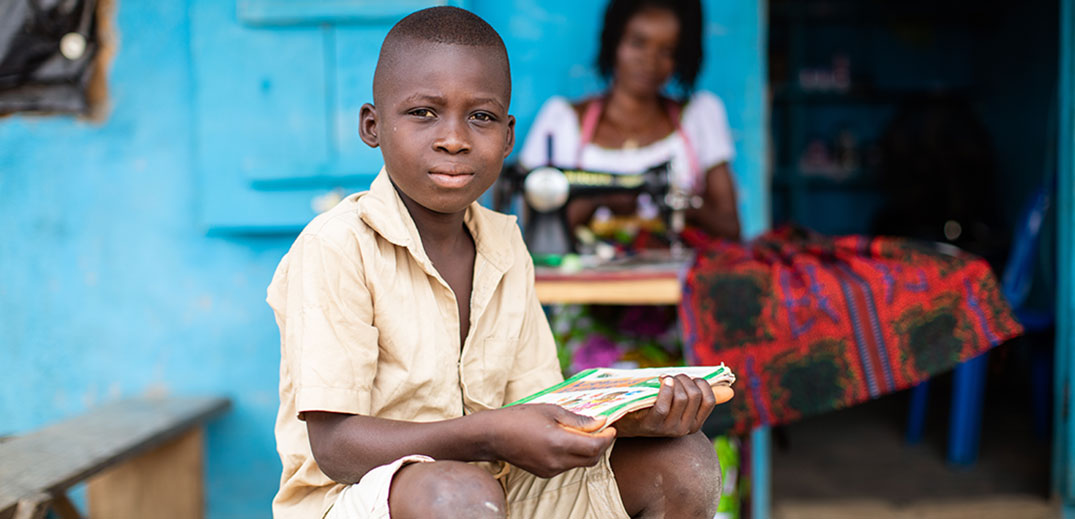Béatrice tuts gently at her son Roméo, softly shaking her head to show him he's made a mistake. He tries reading the word again and does better. She nods, pretending to be stern.
But she can't help letting a little smile escape when he turns back to his book. Reading together is still a novel experience and they both enjoy it, even though Roméo is already 12.
Two years ago, Béatrice opened a small store in the center of her village in Côte d'Ivoire that is home to around 10,000 people. Most of the jobs here are in farming. Cocoa mostly, but crops like coffee are grown as well. The village is big enough to support other kinds of work too, and Béatrice decided that running a store was more her kind of thing.
You could walk across her shop floor in a couple of large strides, but it's tidy and well cared for - the simple wooden structure brightened on the outside by a flash of brilliant blue paint typical of this region. Béatrice is also a talented seamstress, and people from all over the village quickly began visiting her for repairs and dressmaking. But there was a problem.
Reducing risk for kids
"When clients came, I had no idea how to measure them," she said sadly. "My parents didn't send me to school. I couldn't read, or even write my own name. A friend told me there was a new course for adults where I could learn to read and write. So, I went and enrolled."
Béatrice's class was a new women's literacy program set up by the Nestlé Cocoa Plan, an activity organized at community level to help reduce child labor risk, beyond the scope of the company's supply chain. You can read more in Nestlé's 2019 'Tackling Child Labor' report (pdf, 4Mb).
The data in the report shows that parents who can read and write are less likely to allow their children to do dangerous tasks. In almost all cocoa-producing villages in this region of Côte d'Ivoire, illiteracy levels are high. Most adults did not go to school, due to cost, distance or even the lack of a school. Traditional and cultural reasons also play a part.
"Often, it wasn't considered necessary to send every child to school," Nathan Bello, Nestlé's Cocoa Plan Manager in Côte d'Ivoire, explains. "It was often just the village elite, and then the rest didn't go. That's especially true for girls. Traditionally, girls were encouraged to focus more on gaining domestic skillsets at home. Actually, that is often still the case today."
Life-changing skills
Béatrice has only been learning for a year, but she says the new skills have already made a big difference to her life. "Now that I've started learning to read and write, I can take measurements and note them. I can write the price on the products in my shop. When my son comes home from school, I can take his exercise book and look at how he's doing."
Now that both she and Roméo are learning to read, Béatrice feels their prospects are very different. "I didn't go to school, so it was hard for me. Now I hope that my son gets the chance to take a professional role - to become a doctor or something like that."
She returns to her work, cutting a small strip of fabric and gluing it into her order book. Underneath it, she writes the customer's details and the length of the cloth required to fulfil the order. All this from a woman who just last year was still quietly dreaming that one day she would be able to write her own name. "Now I can," she says. "Now I can." A year on, Béatrice's business has grown and Roméo has moved up a grade at school.








